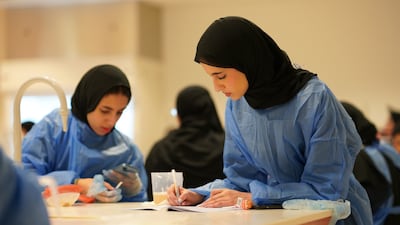Public and private universities in the UAE are being given more autonomy on their admission process, with the Ministry of Education encouraging special focus on subject-specific high school grades under revised guidelines.
It comes after the Emirates Standardised Test, known as Emsat, was scrapped earlier this month.
The new guidelines, being introduced this week, focus on widening the access to higher education so that more high school graduates are able to study at universities, and to give the institutions more flexibility in the admission criteria.
“These guidelines are for all universities, whether it's government or private. We are giving the universities the flexibility to follow these or to come up with their own admission criteria," highlighted Dr Mohammad Al Mualla, undersecretary of the Ministry of Higher Education (MoE) and Scientific Research in UAE.
“Our guidelines encourage universities to use high school grades as a sufficient measure of a student's ability in a relevant subject, and not to depend on the overall grade.” This puts the focus on high school grades for the subject the student wishes to pursue. For example, if a student aims to study physics at university, they would be assessed on their high school scores in physics.
The ministry will focus on four priorities: streamlined procedures and enhanced digital services; improving educational institutions' flexibility by updating licensing and admission criteria; aligning educational outcomes with labour market needs and leveraging partnerships with economic sectors.
Bridging courses on offer
Under the new system, universities can offer various pathways to improve their admission eligibility. “It is now the responsibility of the university to evaluate the applicant and decide what remedial or bridging classes the student needs,” added Dr Al Mualla.
This allows universities to offer students, who do not meet the criteria for a bachelor’s course, options like bridging courses, which is a short-term programme that targets areas a student needs to improve, or diploma programmes.
“We want every (high school) graduate to have the opportunity to access higher education in the UAE.”
Dr Al Mualla explained that Emsat, which was previously mandatory for Emiratis in grade 12 in public and private schools and non-Emiratis in private schools affiliated with MoE, was “designed for the above average student”.
But, by cancelling Emsat, universities have more “flexibility” to choose what works for them. They can either use high school grades, or choose a standardised examination or create their placement test. Dr Al Mualla is hopeful the move will eventually widen the “access to higher education” to more students, thus improving their “chances of employment”.
Stats show gaps in access to higher education
According to the stats shared by the Ministry of Education, 50 per cent of grade 12 students were ineligible to apply for a bachelor's programme, with the ministry’s policies blamed for limiting the access.
Sixty-seven per cent of jobseekers registered on Nafis, established in 2021 to drive the nation's Emiratisation strategy, are high school graduates or had not even graduated from high school.






The decision to change the policy stemmed from this issue, explained Dr Hassan Almheiri, acting assistant undersecretary for Higher Education and Scientific Research Regulation and Governance Sector.
“This is where we changed some of our policies to find a better way to provide further flexibility and accessibility for students to go into higher education and have the opportunity to upskill themselves for the job market.”
He added that the Emsat was cancelled as “it was not doing the purpose”.
“It had a different purpose earlier, but we needed to think about it differently by providing flexibility to the universities to allow the students to be admitted through other criteria.”
Dr Almheiri added that there's still a lot of work to be done, with the Ministry of Education and universities, with counselling plans for students. “This is a step that we need to provide,” he said.
Widening options for students
Students who do not meet the initial entry criteria for a bachelor's programme will now have more options. “They may enter a diploma or higher diploma programme and then progress into that pathway,” Dr Almheriri added, or sign up for bridging courses.
The new policy has already come into effect, with universities asked to implement new admission plans – based on the programmes they are offering – for the next batch starting in the spring or fall.


